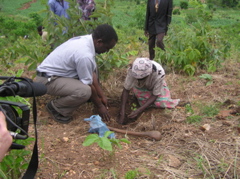On the Slopes Near Dedza
The problems keep coming, and the delay in getting away from Blessings means we will be late getting to the office of the Minister of Forestry for the nation of Malawi. I hate being late to any meeting, but to be late to a meeting with a government official is doubly uncomfortable. When we arrive at the offices of the Forestry Department we are immediately ushered into the office of Kenneth M. Nyasulu, the Minister of Forestry, along with his Deputy Secretary of Forestry. Beside them are seated Gilbert Mtsendero, the assistant Director of Forestry, and Mrs. Myula, the District Forestry Officer for the Lilongwe District Office. Napoleon, Suzi and I take our seats. No one seems to notice, or even care, that we are late arriving. The customary greetings, introductions, and conversation continue for an hour. It is all part of the Malawi tradition and custom of getting to know you, and what you are all about, before getting down to the business at hand. Malawians are masters at determining character, and they will size you up in short order. After the time of greeting five of us get into a Nissan Patrol 3.0 Di and head out of the driveway.
The sun is climbing high in the sky, and the customary fog on distant mountains is already burning away. The green landscape from the recently ended rainy season still punctuates the landscape as we scoot hastily south through the countryside. Family plots of ripe maize spot the landscape brown, and white clouds drift slowly across the African sky. Cassia Spectabilis trees topped with beautiful blossoms of yellow warn of the coming dry season.
They Appear To Tear Long Gashes In The Clouds
Within fifteen minutes the changing landscape begins to roll the road into a slow rollercoaster of curves and hills, and the distant mountains move in to surround us. The farther south we ride, the higher the peaks, and it appears they are tearing long gashes in the
soft underbellies of the low flying clouds. Brown grass huts extend above the head tall grass of the savannah. Ox carts filled with young boys and commerce move north along the road, while the older boys quickly pass them on bicycles burdened with racks of wood. Old women with baskets of vegetables cautiously step to the side in order to avoid the rush. They trudge their way toward a nearby trading center. Coke and Panadol signs mark the sides of stores, along with such interesting signs like the Double Vision Boys School, or the No Farming – No Life Grocery Store. Or what woman would not want to go to the Beautiful Woman Salon. Hills once covered with plush forests now stand naked and ashamed. Peaks stare down on them in disbelief as village scavengers seek the last stand of trees for enough wood to cook the next meal. One must sympathize with the village woman who has no other means to create a fire with which to feed hungry children. Yet it is this pitiful lot that is robbing the future of the future forests.
A Fat Man Lying On His Back
Fifteen more minutes and the vehicle glides into a valley, across a stream, and over the unmarked boundary between the Lilongwe District, and the Dedza District. Before us in the distance looms Dedza Mountain. It looks like a fat man lying on his back. A little farther, the 4 x 4 slows, and then turns left toward the mountain, and into Dedza Boma. The route, long since forgotten by the highway department, draws us down an impossible dirt path to the backside of the mountain. More potholes and finally we break into the open, looking out over a breathtaking vista. Wild flowers flow down the mountainside, and people with ancient hoes dot the hillside in intense labor. Men with bare feet, hardened and blistered by the rough soil, toil in the mid-day sun to create little clearing around each tiny, fragile seedling. Everywhere there are stump reminders of ancient forests. Around a sharp curve we enter the Dedza Mountain Project. The area of work on the southwest side covers 40 hectors, or about 88 acres. An estimated 20,000 seedlings have been planted, and they are now being carefully weeded. Some of the village men can be observed leaving the staging area with big grins, and boxes of shoes they have just received as a reward from the “Shoes For Trees” program. We wave. They wave back.
They Appear To Mock The Naked Valley
We stop at the Forestry Office to talk with some of the workers. Everyone knows of the Shoe Incentive Program, and everyone agrees it is what is making the tree-planting program so successful. After hearing and seeing the results of the incentive program from these men, we get back in the vehicle and head around the mountain to the northwest side. Again we find a road that has had no care for several years. It is an impossible dirt path, and must have been a target range for B-52 carpet-bombing. One has to wonder how so many potholes can cluster together, all in one place, and all at the same time of year. We pass a giant pine forest of 3,500 hectors planted in 2002. The trees reach skyward, as they appear to mock the naked valley nearby. The Nissan crawls around the now famous mountain of ancient rock paintings. They were painted hundreds of years ago by the African Bushmen, or pigmies. Arriving on the west side of the mountain we enter the Chongoni forest where 20,000 seedlings have recently been planted. As with the northwest side, in the Dedza Mountain Project, we are advised the success of the project can be credited to the “Shoes For Trees” Project instituted by the Malawi Forestry Department, and the Blessings/Malawi Project Incentive Program Initiatives. Across the hillside workers are seen with sickles cutting away at the weed-covered earth, and with ancient hand held hoes clawing out the needed firebreaks.
It Is A Road Less Traveled
The vehicle comes to a stop, and the Forest Department workers, along with Napoleon Dzombe, leave the vehicle and walk out into the field to greet the workers. Smiles and greetings are extended all around and Napoleon encourages them to continue their good work in order to receive new pairs of shoes from the next shipment. The workers seem happy to know such a reward is coming their way, and smiles of gratitude reflect their pleasure. It looks like we have reached a remote place at the end of the road, certainly a road less traveled, yet, in reality, we are in the very center of the action. One hundred and fifty pairs of shoes for every 20,000 seedlings planted and weeded. There is no other payment, no other incentive, only the pair of shoes to help reforest their land. At this work site we stop to talk with Joe Mbangombe. Joe is a forest service employee with seven years of experience with the department. He is from Lilongwe, and Joe wants to attend the Bunda College of Agriculture in order to obtain a degree in Forestry. He cannot go until he finds a sponsor to help him with the cost. Dzombe asks him about the plans for the next season of tree planting.
“Will clothes work as well as the shoes have worked, if we can give you clothes for trees next year,” he asks? Joe responds, “Yes, we want to plant 500,000 seedlings next year. We simply need incentives to get the village people to come out and help. Of course we also need panga knives, pruning shears, and some fire fighting equipment. If we have these things we can grow our forests back again.”
For The Sake Of All Of Us
As the afternoon begins to glide toward the western horizon we make our way back to the black ribbon of tarmac and turn north on M-1 toward Lilongwe and home. The driver puts in a cassette tape and out rolls the strains of Dolly Parton, then an assortment of other country and western singers, compliments of Nashville, Tennessee back in the U.S. Two Malawi Forest Service Officials, in the seats right behind us, can be heard softly clapping to the beat. It is obvious there is really not much difference between peoples, no matter where they are in the world. And another thing is certainly true. It is critical that these people be successful in what they are trying to do. The forests of Malawi must be reestablished … for the sake of everyone.
By the end of the its first year the Shoes For Trees Program, starting from a single 40-foot trailer of shoes, nets a total of 400,000 seedlings successfully planted and weeded.
.jpg)
.jpg)
.jpg)


